Diesel Engine Upgrades: More Horsepower, More Fun
Why Diesel Engine Upgrades Transform Your Fleet Performance
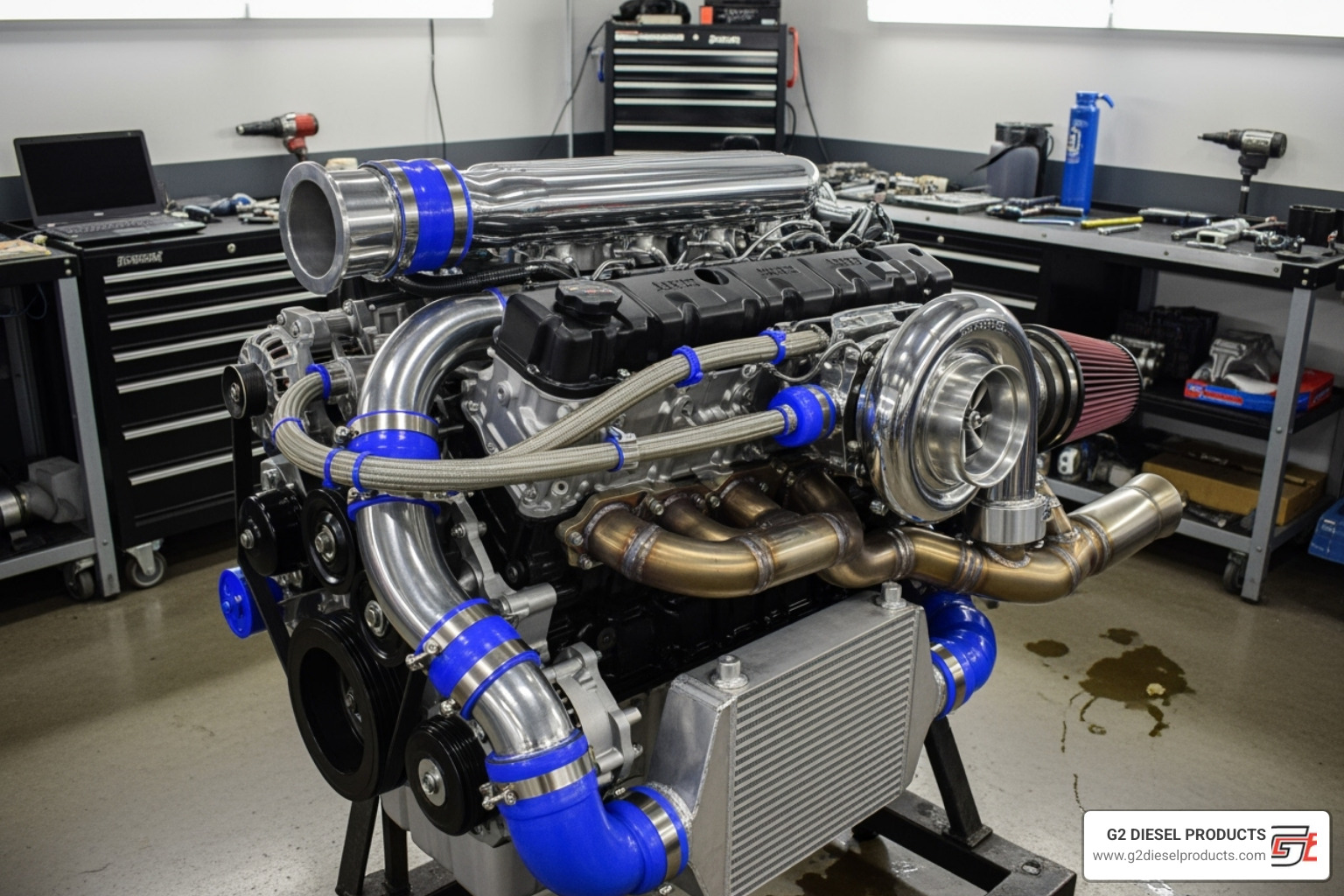
Diesel engine upgrades offer a world of possibilities for fleet managers and truck enthusiasts looking to maximize their vehicle's potential. Whether you're dealing with heavy hauling, seeking better fuel efficiency, or simply wanting more reliable power, the right modifications can transform your truck's performance.
Popular diesel engine upgrade options include:
- Tuners and programmers to reprogram the ECU for more power.
- Cold air intake systems to boost power with denser air.
- Performance exhaust systems to add horsepower and reduce exhaust temperatures.
- Turbocharger upgrades to dramatically increase airflow.
- High-performance fuel injectors to deliver more fuel for maximum power.
- Intercooler improvements to keep intake temperatures low.
Modern diesel engines are powerful air pumps. The more efficiently you move air and fuel through them, the more power and torque you generate. For fleet managers, upgrades aren't just about raw power; they're about reliability under load, improved fuel economy, and reduced maintenance costs through better engine efficiency. This guide will walk you through the most effective upgrades, explaining how each modification impacts performance to help you make informed decisions for your fleet.
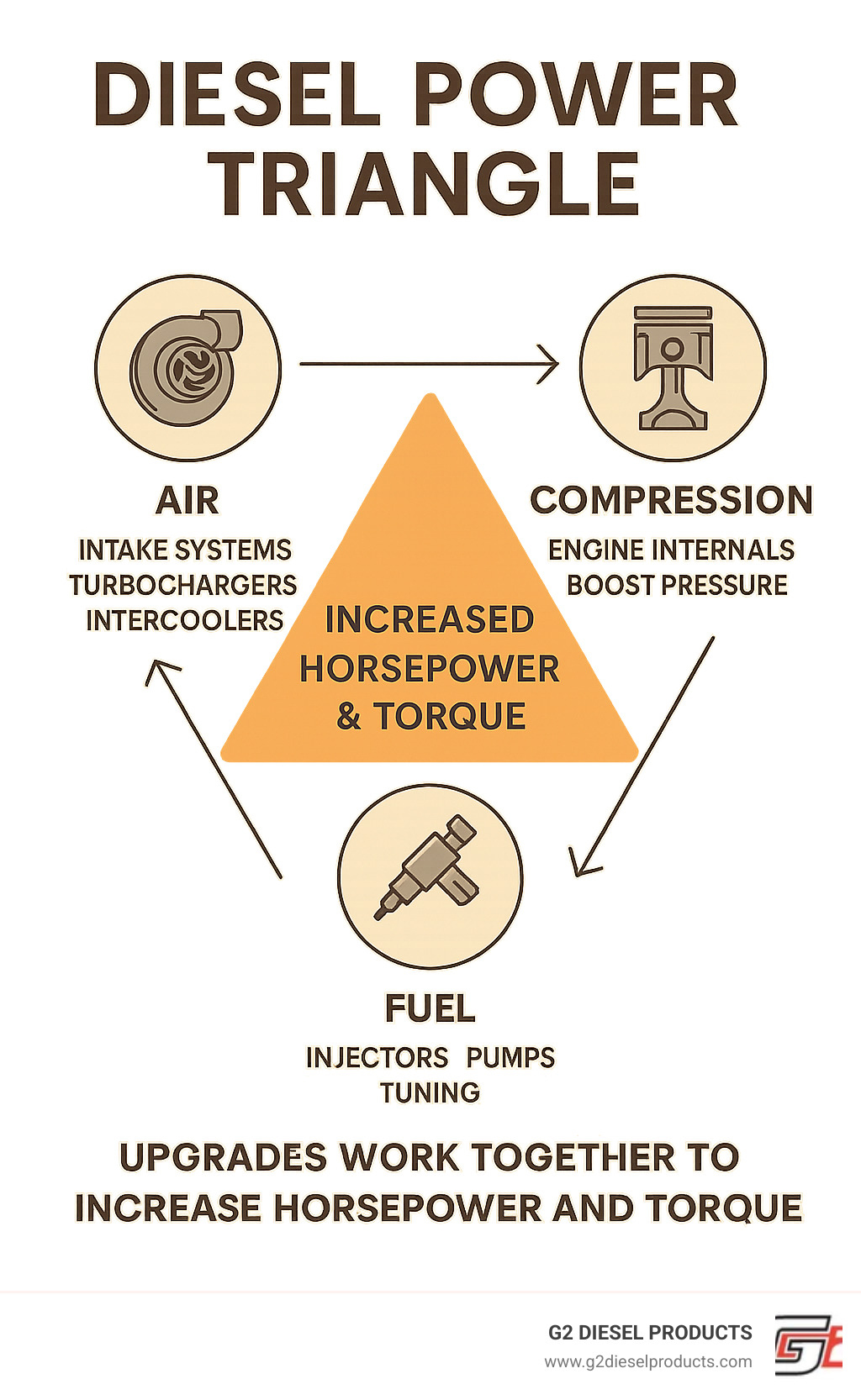
The Foundation of Power: How Diesel Engines Make More Horsepower
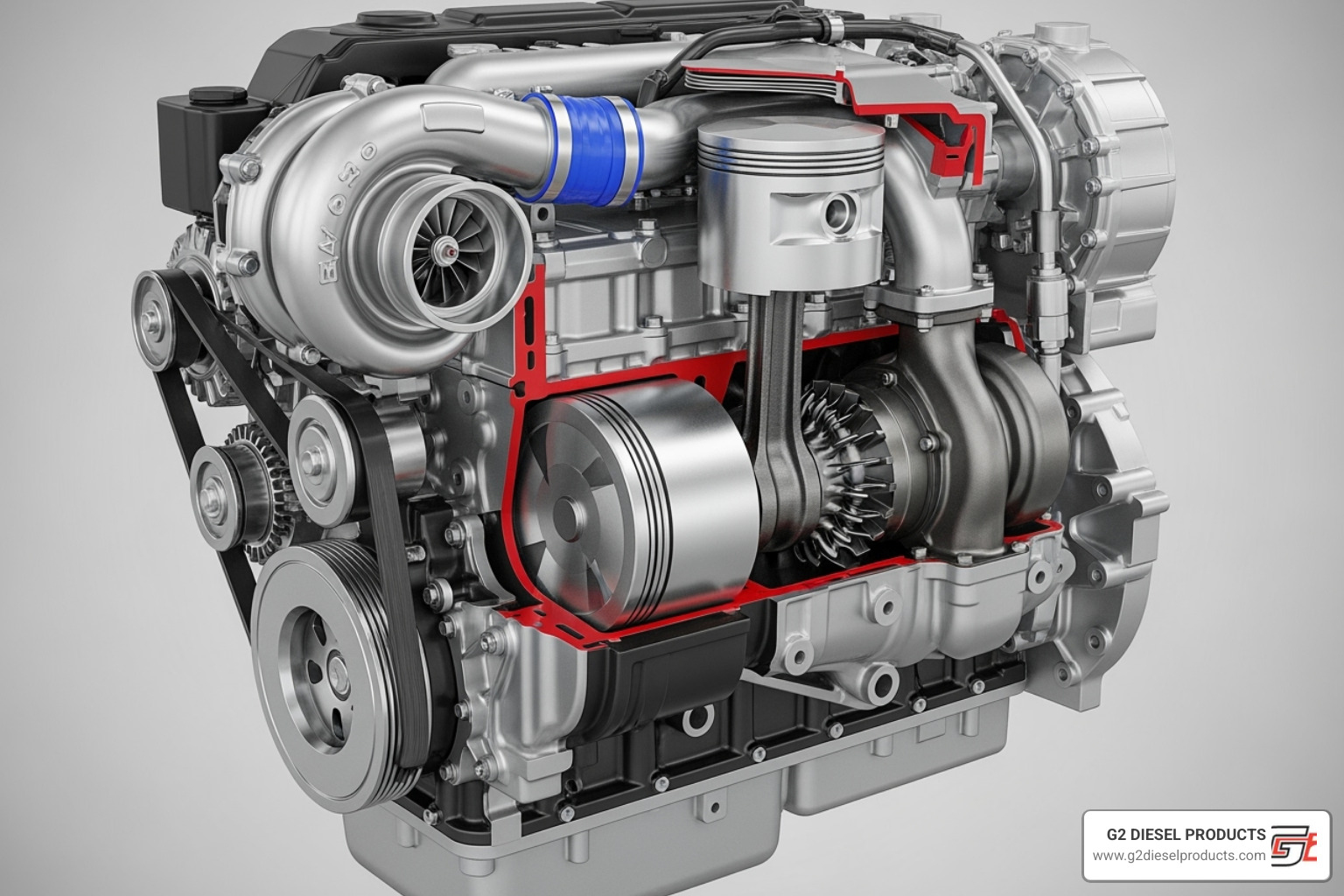
At its heart, a diesel engine is built for durability and immense torque. It works on the principle of compression ignition: air is compressed to an extremely high temperature, and then fuel is injected, causing spontaneous combustion that drives the piston down.
So, how do you increase horsepower? It boils down to a few core principles:
- Increase Combustion Pressure: Get more air and fuel into the cylinder for a more powerful combustion event.
- Increase Power Strokes (RPMs): Allowing the engine to complete more combustion cycles per minute generates more power. This often requires upgrading internal components to handle the increased speed and stress.
- Decrease Friction: Less internal friction means more of the engine's power is transferred to the wheels. This can involve using lighter components or optimizing lubrication, as highlighted in scientific research on reducing friction.
When we talk about engine efficiency, we're looking at how well the engine converts fuel energy into usable work. Every component plays a role.
Finally, let's touch on torque vs. horsepower. Torque is the rotational force for pulling heavy loads, while horsepower is how quickly that work gets done. Upgrades aim to increase both, giving you more pulling power and faster acceleration.
The Ultimate Guide to Bolt-On Diesel Engine Upgrades
When you're ready to transform your diesel truck's performance, bolt-on diesel engine upgrades are the perfect starting point. These modifications don't require tearing apart your engine; they simply bolt onto existing systems to deliver impressive gains. Factory settings often prioritize emissions and broad appeal over peak performance, which is where aftermarket parts shine.
Tuners and Programmers: The Brains of the Operation
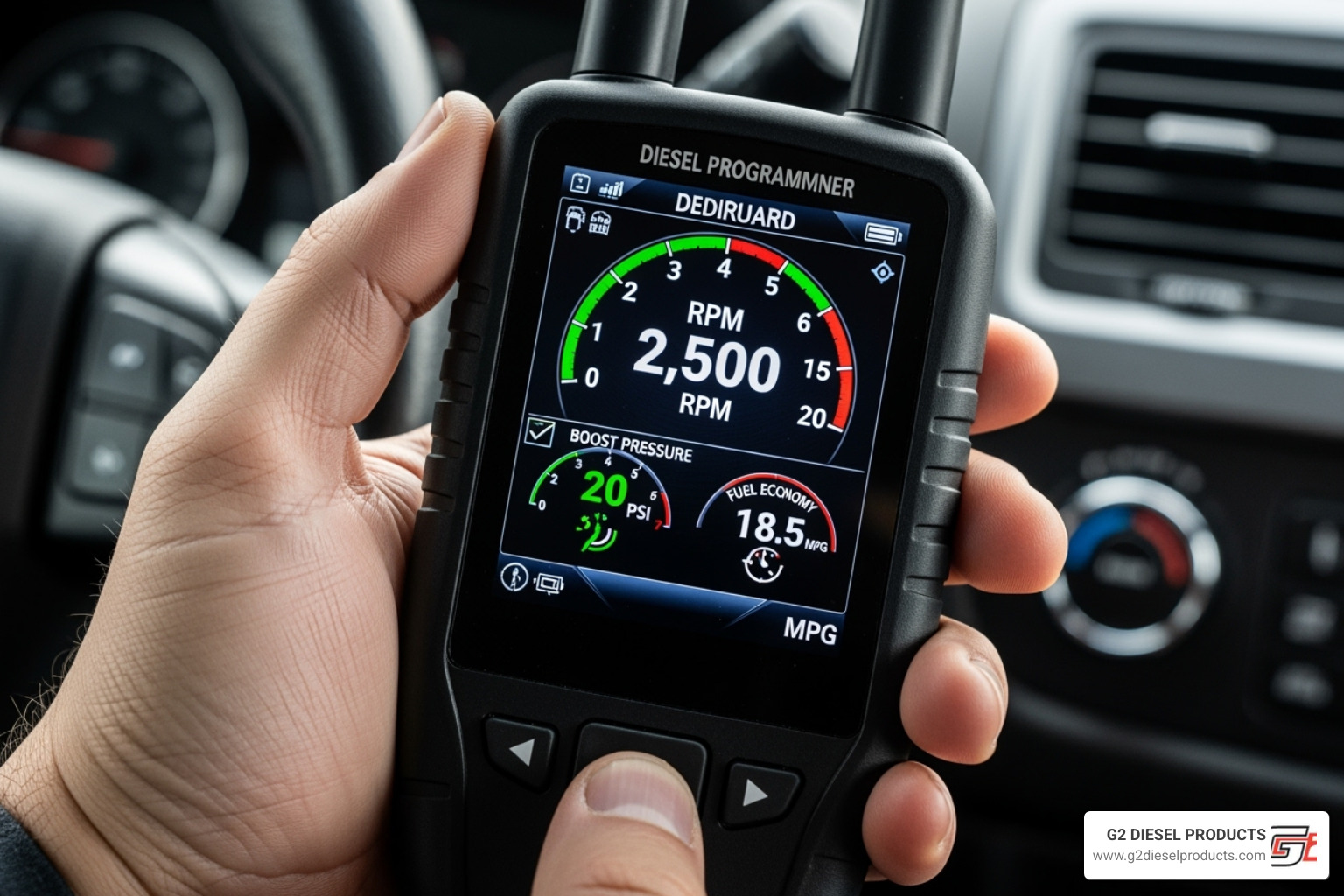
Your truck's Engine Control Module dictates engine performance. Tuners and programmers rewrite the ECM's conservative factory software to open up hidden potential. By adjusting fuel delivery, boost pressure, and injection timing, you can achieve horsepower and torque gains of 20-50%. Many tuners offer multiple modes for performance, towing, and economy settings.
Upgrading Your Air Intake System: Let Your Engine Breathe
Your diesel engine is a massive air pump. A cold air intake system provides cooler, denser air to your engine. Cooler air contains more oxygen, leading to better combustion and 20-30% horsepower gains, improved throttle response, and potentially better fuel economy.
Performance Exhaust Systems: A Better Exhale for More Power
Factory exhausts create backpressure, forcing your engine to work harder. A performance exhaust system provides clear flow, lowering Exhaust Gas Temperatures (EGTs) and enabling faster turbo spool. Expect horsepower gains of 10-20 HP, improved torque, and better fuel efficiency.
Turbocharger Upgrades: The Heart of Forced Induction
Turbos use exhaust energy to force more air into the engine. Modern upgrades feature larger compressor wheels or Variable Geometry Turbos (VGT) that optimize performance across the RPM range. Power gains are substantial, often 5-10x increase over naturally aspirated engines.
Intercooler Improvements: Keeping Your Cool Under Pressure
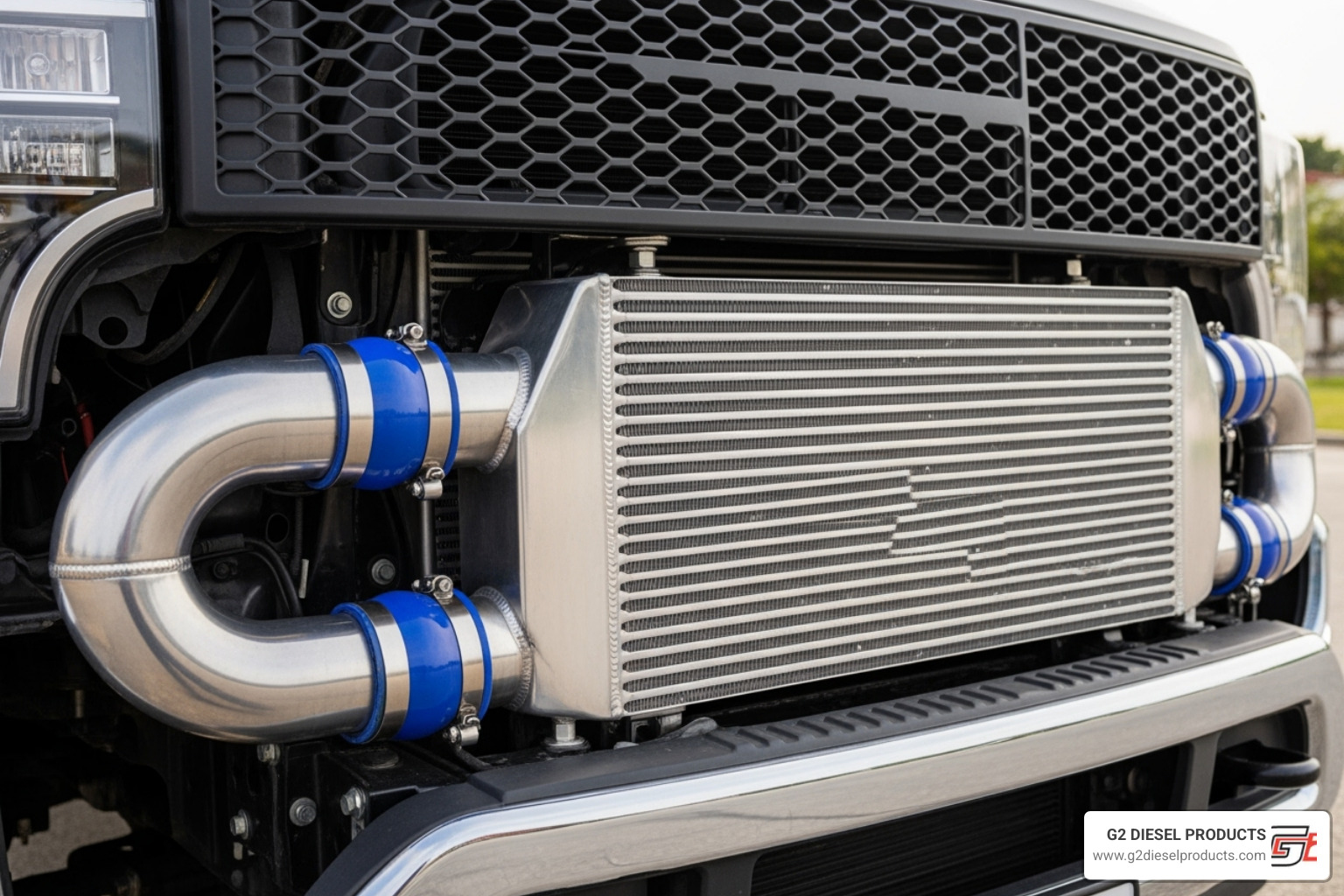
When a turbo compresses air, it gets hot. An intercooler cools the intake air, increasing its density and packing more oxygen into the cylinder. Upgraded intercoolers prevent heat soak during heavy use and support higher boost levels.
High-Performance Fuel Injectors: The Key to Releasing Power
When you increase airflow, you need more fuel to match. High-performance fuel injectors deliver increased fuel volume with precision. Finer atomization leads to more complete combustion. At G2 Diesel Products, our performance diesel injectors are designed for modified engines. Understanding how common rail injectors work highlights the precision engineering required for diesel engine upgrades.
Supporting Your Newfound Power: Drivetrain and Monitoring
Adding horsepower puts stress on other systems. Your stock drivetrain was engineered for factory power levels, and pushing beyond those limits without proper support can lead to expensive failures.
Transmission and Drivetrain Considerations
Your transmission needs reinforcement when you boost output. Stock transmission limits become apparent quickly, leading to slippage and overheating.
- Torque converter upgrades are critical for automatics to prevent slippage under high torque.
- For manual transmissions, upgraded clutch systems ensure power transfers to the wheels.
- Billet transmission components offer the ultimate solution for serious power builds.
Performance Gauges: Your Engine's Vitals
Running a modified diesel without proper gauges is dangerous. Performance modifications push your engine beyond factory parameters.
- Exhaust Gas Temperature (EGT) gauges provide early warning of overfueling that can destroy pistons.
- Boost pressure gauges monitor turbo performance and help spot problems.
- Transmission temperature gauges prevent overheating in automatics.
Performance gauges provide the information needed to operate your modified truck safely.
Smart Modifying: Risks, Rules, and Maintenance
Before you start modifying, understand the risks, legal requirements, and maintenance needs.
Potential Risks and Key Considerations
Voiding warranties is a primary concern. More power means increased stress on components. A balanced build is important; all systems must work together. Complex jobs benefit from professional installation.
Staying Compliant: CARB Approval and Emissions
In California and many states, performance parts must have a CARB EO number. Modern trucks use DPF, EGR, and DEF systems to control emissions, and tampering with these systems is illegal. Look for 50-state legal parts.
The Role of Regular Maintenance
Regular maintenance is critical for high-performance engines. Oil changes, fuel filter maintenance, and air filter replacement ensure optimal performance and catch problems early through tune-ups.
Frequently Asked Questions about Diesel Upgrades
Here are the most common questions we get about diesel engine upgrades, with straight answers based on real-world experience.
What is the best first upgrade for a diesel truck?
Most enthusiasts start with an ECU tuner or programmer. It's the best bang-for-your-buck upgrade, offering immediate and significant gains in power and torque. Many tuners also have economy modes that can improve fuel mileage. A performance exhaust system is another great starting point for better sound, lower EGTs, and a modest power bump.
Can diesel engine upgrades increase both horsepower and fuel economy?
Yes, but with a catch. An economy-focused tune, combined with intake and exhaust upgrades that improve engine efficiency, can definitely improve your MPG. Some drivers report saving 5 to 10 percent at the pump. However, tunes designed for maximum horsepower will always consume more fuel to achieve those power levels. The key is the flexibility to switch between tunes based on your needs.
Do I need to upgrade my transmission if I add more power?
It depends. A mild tune adding 50-75 horsepower is often manageable for a stock transmission in good condition. However, once you start stacking multiple upgrades or using aggressive, high-horsepower tunes, transmission upgrades become necessary. The increased stress can cause slippage, overheating, and premature failure. A balanced build, where the transmission can handle the engine's output, is a reliable build.
Conclusion: Building Your Ultimate Diesel Truck
You've just taken a deep dive into diesel engine upgrades. The most important lesson is to start with a clear goal and build systematically. Whether you're after towing power, fuel economy, or raw performance, every modification should serve your purpose.
A diesel engine is a complete system of air, fuel, and compression. A successful build balances performance gains with long-term durability. This means choosing quality components, maintaining proper air-fuel ratios, and monitoring your engine's vitals with performance gauges.
At G2 Diesel Products, we understand this balance. Our experience manufacturing high-quality diesel fuel injectors for Volvo, Mack, Kenworth, and Paccar trucks has taught us that precision and reliability matter just as much as raw performance. More air from an upgraded turbo needs more fuel to match, and our injectors deliver it with the precision your build demands.
Ready to fuel your build with components engineered for reliability and power? Explore our high-performance SMART F2P injectors and see how proper fuel delivery can open up your engine's true potential. Your ultimate diesel truck is waiting. Let's build it together, one reliable upgrade at a time.
